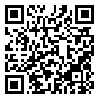Thu, May 2, 2024
[Archive]
Volume 13, Issue 11 (11-2015)
IJRM 2015, 13(11): 715-720 |
Back to browse issues page
Download citation:
BibTeX | RIS | EndNote | Medlars | ProCite | Reference Manager | RefWorks
Send citation to:



BibTeX | RIS | EndNote | Medlars | ProCite | Reference Manager | RefWorks
Send citation to:
Dan W, Jing G, Liangbin X, Ting Z, Ying Z. Association of follicle stimulating hormone receptor promoter with ovarian response in IVF-ET patients. IJRM 2015; 13 (11) :715-720
URL: http://ijrm.ir/article-1-601-en.html
URL: http://ijrm.ir/article-1-601-en.html
1- Department of Obstetrics and Gynecology,Ren Ming Hospital of Wu Han Univeristy,Wu Han,China
2- Department of Obstetrics and Gynecology,Ren Ming Hospital of Wu Han Univeristy,Wu Han,China , xialiangbin@hotmail.com
2- Department of Obstetrics and Gynecology,Ren Ming Hospital of Wu Han Univeristy,Wu Han,China , xialiangbin@hotmail.com
Abstract: (2428 Views)
Background: Poor ovarian response phenomenon has been observed in some of the in vitro fertilization-embryo transfer patients. Some investigations found that follicle stimulating hormone receptor (FSHR) gene plays a role in the process, but no direct evidence shows the correlation between genotypes of FSHR and ovarian response. Objective: Exploring the molecular mechanism behind the mutation of FSHR promoter association with ovarian granulosa cells and poor ovarian response. Materials and Methods: This cross sectional study was performed using 158 women undergoing the controlled short program ovarian stimulation for IVF treatment. The 263 bp DNA fragments before the follicle stimulating hormone (FSH) receptor 5' initiation site were sequenced in the patients under IVF cycle, 70 of which had poor ovarian response and 88 showed normal ovarian responses. Results: With a mutation rate of 40%, 63 in 158 cases showed a 29th site G→A point mutation; among the mutated cases, the mutation rate of the poor ovarian responders was significantly higher than the normal group (60% versus 23.9%; χ2=21.450, p<0.001). Besides, the variability was also obvious in antral follicle count, and ovum pick-ups. The estradiol peak values and the number of mature eggs between the two groups had significant difference. However, there was no obvious variability (t=0.457, p=0.324) in the basic FSH values between the two groups (normal group, 7.2±2.3 U/L; mutation group, 7.1±2.0 U/L). Conclusion: The activity of FSHR promoter is significantly affected by the 29th site G→A mutation that will weaken promoter activity and result in poor response to FSH.
Keywords: Follicle stimulating hormone receptor, Ovarian granulosa cells, Infertility, Ovarian response, Promoter
Type of Study: Original Article |
References
1. Lazaros LA, Hatzi EG, Pamporaki CE, Sakaloglou PI, Xita NV, Markoula, et al. The ovarian response to standard gonadotrophin stimulation depends on FSHR, SHBG and CYP19 gene synergism. Assist Reprod Genet 2012; 29: 1185-1191. [DOI:10.1007/s10815-012-9849-0]
2. Gerasimova T, Thanasoula MN, ZattasD, Seli E, Sakkas D, LAlioti MD. Identification and in Vitro Characterization of Follicle Stimulating Hormone (FSH) Receptor Variants Associated with Abnormal Ovarian Response to FSH. Clin Endocrinol Matab 2010; 95: 529-536. [DOI:10.1210/jc.2009-1304]
3. Parmentier M, Libert F, Maenhaut C, Lefort A, Gerard C, Perret J, et al. Molecular cloning of the thyrotropin receptor. Science 1989; 246: 1620-1622. [DOI:10.1126/science.2556796]
4. Wunsch A, Ahda Y, Banaz Yasar F,Sonntag B, Nieschlag E, Simoni M, et al. Single-nucleotide polymorphisms in the promoter region influence the expression of the human follicle-stimulating hormone receptor. Fertil Steril 2005; 84: 446-453. [DOI:10.1016/j.fertnstert.2005.02.031]
5. Desai SS, Achrekar SK, Paranjape SR, Desai SK, Mangoli VS, Mahale SD. Association of allelic combinations of FSHR gene polymorphisms with ovarian response. Reprod Biomed Online 2013; 27: 400-406. [DOI:10.1016/j.rbmo.2013.07.007]
6. Cai J, Lou HY, Dong MY, Lu XE, Zhu YM, Gao HJ, et al. Poor ovarian response to gonadotropin stimulation is associated with low expression of follicle-stimulating hormone receptor in granulosa cells. Fertil Steril 2007; 87: 1350-1356. [DOI:10.1016/j.fertnstert.2006.11.034]
7. Simoni M, Nieschlag E, Gromoll J. Isoforms and single nucleotide polymorphisms of the FSH receptor gene: implications for human reproduction. Hum Reprod Update 2002; 8: 413-421. [DOI:10.1093/humupd/8.5.413]
8. Desai SS, Achrekar SK, Pathak BR. Follicle-stimulating hormone receptor polymorphism (G-29A) is associated with altered level of receptor expression in Granulosa cells. J Clini Endocrinal Metab 2011; 96: 2805-2812. [DOI:10.1210/jc.2011-1064]
9. Wunsch A, Ahda Y, Banaz-Yasar F, Sonntaq E. Single-nucleotide polymorphisms in the promoter region influence the expression of the human follicle-stimulating hormone receptor. Fertil Steril 2005; 84: 446-453. [DOI:10.1016/j.fertnstert.2005.02.031]
Send email to the article author
| Rights and permissions | |
 |
This work is licensed under a Creative Commons Attribution-NonCommercial 4.0 International License. |




